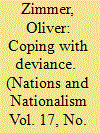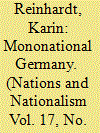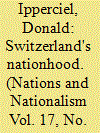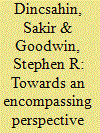|
|
|
Sort Order |
|
|
|
Items / Page
|
|
|
|
|
|
|
| Srl | Item |
| 1 |
ID:
107273


|
|
|
|
|
| Publication |
2011.
|
| Summary/Abstract |
This article highlights two processes that shaped Swiss nationhood in the long nineteenth century. The first concerns the competition between different nation-states and the nationalist visions these contests engendered. In a Europe dominated by the norm of the culturally and ethnically homogenous nation, the Swiss authorities, public intellectuals and various political representatives were desperate to display an image of national authenticity to the outside world. The result was a nationalism that combined voluntaristic and organic elements. In the second and main part of this article, the focus turns on citizenship; it is conceived not only as a social and legal institution, but also as a cognitive prism through which people defined their membership in the national community. Remarkably, the authority in granting national citizenship to foreign nationals remained firmly in the hands of the cantons and, above all, the Swiss municipalities. In practical terms, this meant that the Gemeinde provided the institutional and cognitive frame through which nationhood was primarily experienced, imagined and defined. While Switzerland represents a particularly strong case of a communalist polity, it should not be treated as unique. Instead, it should alert us to a potentially fertile yet little-explored area of research: what might be called the communal embededdness of the national(ist) imagination.
|
|
|
|
|
|
|
|
|
|
|
|
|
|
|
|
| 2 |
ID:
107279


|
|
|
|
|
| Publication |
2011.
|
| Summary/Abstract |
It has become common for scholars of nations and nationalism to use banknotes, coins and postage stamps as passing examples of everyday objects expressive of nationalism. Until recently, however, it has been less common for these objects to form the focus of empirical enquiries that substantiate their contribution to the creation and transmission of national symbolism. This article addresses this lacuna through an empirical investigation of over 300 years of Scottish banknote iconography. In their symbolic content, banknotes are shown to be amenable to the service of both national and non-national political agendas. To explain this phenomenon, we advance three interrelated arguments. First, we contend that variations in banknote iconography reflect the different political contexts in which notes were produced and the distinctive loyalties and customer constituencies of the banks that issue them. Second, we argue that changes in banknote imagery reflect changes in the scale of their circulation. Third, we argue that Scottish banknotes have always included iconography that constructs the image of the bank and advertises its reliability, often through association with national images. The article concludes by addressing Scotland's place in wider understandings of the iconographic power of banknotes.
|
|
|
|
|
|
|
|
|
|
|
|
|
|
|
|
| 3 |
ID:
107274


|
|
|
|
|
| Publication |
2011.
|
| Summary/Abstract |
This article presents a critique of Will Kymlicka's theory of multiculturalism. It examines Kymlicka's theoretical distinction between mononational and multinational states and his empirical examples that support this theory: Germany as an example of a mononational state and Switzerland as an example of a multinational state. By means of a content analysis of constitutions, it demonstrates that Danes and Sorbs should be characterised as national minorities in Germany, whereas the French- and Italian-speaking communities of Switzerland do not constitute nations. The distinction between mono- and multinational states proposed by Kymlicka does not hold for Germany and Switzerland, and hence must be approached anew, theoretically as well as empirically.
|
|
|
|
|
|
|
|
|
|
|
|
|
|
|
|
| 4 |
ID:
107258


|
|
|
| 5 |
ID:
107264


|
|
|
| 6 |
ID:
107262


|
|
|
| 7 |
ID:
107270


|
|
|
| 8 |
ID:
107276


|
|
|
|
|
| Publication |
2011.
|
| Summary/Abstract |
In this article, I explore the subject of Switzerland's nationhood in light of a theoretical approach based on normative principles. This approach has the advantage of avoiding the definitional conundrum arising from the plurality of purely descriptive (often historical) definitions of nationhood. Instead, in accordance with certain normative inferences concerning what the nation ought to be given the principles of democracy, law and inclusion, it portrays the nation as a political entity having the largest possible group of individuals instituting a space of public discussion within a state. In this normative definition, attention should be drawn to the concept of 'space of public discussion', which, to my mind, entails the existence of a common public language used by its citizens - something notably different from either the multilingualism of the elite or a common parliamentary language. Proceeding in this way, I will defend the idea that Switzerland is a multinational state on the basis that cantons may be considered small nations, although certain pressures on the boundaries of the cantonal public spaces tending to expand them to the whole of the linguistic region must also be taken into
|
|
|
|
|
|
|
|
|
|
|
|
|
|
|
|
| 9 |
ID:
107280


|
|
|
|
|
| Publication |
2011.
|
| Summary/Abstract |
This article focuses on the plight of the Jews in Turkey during the Second World War, with the intention of analysing specific historical events through the lenses of leading theories of nationalism. First we review recent developments in historiography that contribute the framework for understanding both the hermeneutical possibilities and limitations when addressing historical texts. Then we employ three theories of nationalism - the ethno-symbolist, instrumentalist and social constructivist - as a means of analysing and interpreting the historical events of the Jewish predicament vis-à-vis the Republic of Turkey. We conclude by suggesting what impact our findings may have on the narratives from this time period, and the way in which we can understand narratives today.
|
|
|
|
|
|
|
|
|
|
|
|
|
|
|
|
|
|
|
|
|